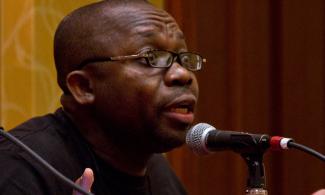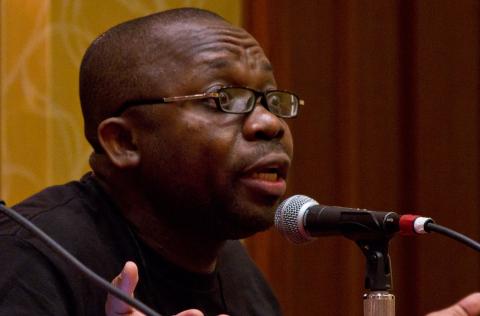
Boko Haram is not an ethnic militia group with an agenda for ethnic domination or for self-determination. It is not a local gang like those in the Niger Delta, fighting for resource control. Boko Haram is a militant group with a religious agenda linked with other militant groups around the globe. Boko Haram is fighting an ‘Islamic’ cause. The link between Boko Haram and their version of Islam is very strong and that is why the group has been operating mainly from and within the Muslim majority communities in the country.
As world leaders gathered at the French capital to march in solidarity with France following a brutal attack on its citizens by terrorists, something far more atrocious and horrifying in scale and severity unfolded in north-east Nigeria. Boko Haram militants massacred over 2000 persons, mainly women, children and elderly people.

While in France, the militants attacked to avenge the publication of the cartoon of Prophet Muhammad (pbuh), in Nigeria, Boko Haram militants have a different agenda: to implement Sharia law and turn the country into an Islamic state. For the latter, the motive is much stronger and hence, much more vicious.
But this campaign is not a new development in Nigeria. Boko Haram is not the first militant group to mobilise for Sharia.
At independence, Nigeria inherited an extremist Islam. This radical form of Islam is a legacy of Sheikh Uthman Dan Fodio, a Muslim scholar-turned-militant who founded the Sokoto Caliphate. Ever since, the quest for Sharia and formation of an Islamic state has haunted the people of the country.
Since independence, northern Nigeria has witnessed campaigns and clashes by state and non-state actors with a competing political Islamic agenda. In the 1980s, an Islamic militant group known as the Maitatsine launched violent attacks in different states in northern Nigeria to enforce its purist form of Islam. Other militant groups have carried out similar attacks which the government succeeded in neutralising.
But this has not been the case with Boko Haram.
The group remains the most brutal terrorist organisation in the history of Nigeria. Its attacks have claimed more lives and caused more havoc and mayhem than all other past uprisings combined. Nigeria is at the end of its wit in terms of finding ways and means to tackle Boko Haram. This is mainly due to local and international politics. Nigeria has asked for and received international military support and intelligence, but still the attacks have not reduced.
Instead the militants have become more vicious and deadly in their operations. The international campaign to bring back over 200 girls kidnapped by the militants has not brought effective military or political solution to the problem. The combined regional efforts of Nigeria, Cameroon, Chad and other neighbouring countries have yielded very limited results.
Why is this case?
Let us try to dissect the issue a bit.
Boko Haram is not an ethnic militia group with an agenda for ethnic domination or for self-determination. It is not a local gang like those in the Niger Delta, fighting for resource control. Boko Haram is a militant group with a religious agenda linked with other militant groups around the globe. Boko Haram is fighting an ‘Islamic’ cause. The link between Boko Haram and their version of Islam is very strong and that is why the group has been operating mainly from and within the Muslim majority communities in the country.
Some people may disagree with the Islamic character of Boko Haram, but the group has made its mission and objective clear: it is Islamic – period. It is either that Boko Haram militants and sympathisers are in the majority in these areas or they are a minority with a major influence. Whatever the case, Boko Haram commands a significant influence among the Muslim population in north-east Nigeria.
There is a clear link between Boko Haram and the political establishment in northern Nigeria. This link needs to be broken. The Sultan of Sokoto once urged the Nigerian government to initiate a dialogue with the terrorist group and to consider granting amnesty to the militants which the Nigerian government did. The current Emir of Kano once attributed the bloodletting campaign of Boko Haram militants to abject poverty and marginalisation of northern Nigeria.
There has been reluctance on the part of the political establishment to call these radical militants by their name. Boko Haram militants are described as ‘insurgents’ who are posing security challenges to Nigeria. Many people have been misrepresenting the situation and using evasive language to portray these terrorists. This has hampered efforts to comprehend and eradicate the problem.
Boko Haram and many Muslim politicians in northern Nigeria are united in the goal of implementing Sharia law and turning Nigeria, or at least the Muslim-majority states in northern Nigeria, into an Islamic state. The local political connection has not helped the situation.
Boko Haram wasn’t always this prominent. Its activities and agitations were localised in Borno where it all began. But the mishandling by politicians in the home state apparently turned this group into the national vampire it is today.
Boko Haram has been politicised greatly, so much so that now it has become a liability, a national albatross hanging on the neck of Nigerians. Some people have attributed the attacks and kidnappings by this group to be the work of those who oppose the government of President Goodluck Jonathan. But Boko Haram started waging its campaign way before Jonathan came to power.
The elections are just around the corner, and Boko Haram is now a campaign issue. One of the candidates vying to become the president has pledged to bring an end to the attacks if he is elected. The candidate did not state clearly how he would deal with the issue; assuming he has the magic wand to neutralise the militant group, why can’t he make it known? Why has he not made it known until now? Why is he waiting to be elected as president before putting forward the proposal to end these vicious attacks? Why is he not assisting the current government? Are elections more important than people’s lives?
Unfortunately, this situation is not just local – the international community is just the same. At the peak of the #BringBackOurGirls campaign, many western countries pledged to assist Nigeria in finding the girls and ending the attacks and killings by Boko Haram. But that has not materialised yet. Instead Nigeria has witnessed more killings and kidnappings since then.
And my question is: why is this so?
Why has the international community failed in giving Nigeria the robust urgent support it needs to address this problem?
Why have the western countries not assisted Nigeria in tracking down these militants the way they are supporting France to tackle the terrorists who attacked and killed French citizens? Are French lives more important than Nigerian lives?
Why has the US not supported Nigeria in dealing with Boko Haram the way it dealt with those who carried out the Boston Marathon bombing?
Thus, anyone can see that the Boko Haram issue is plagued by a lot of political motives – pertaining to local, national and international politics. It is a politics of hypocrisy, double standards and insensitivity. It is a politics of the vulture – a politics that feeds on the corpses of dead bodies that litter the streets and roads of northern Nigeria.
This politics is costing lives and exposing the wretchedness of our acclaimed sense of humanity and international solidarity. This politics is hampering efforts to effectively degrade and neutralise Boko Haram. This politics does not speak well of Nigeria and the world.